The School of ICT Management at Wray Castle Ltd offers a comprehensive range of training programs designed to equip professionals with the skills and knowledge needed to excel in the rapidly evolving field of information and communication technology (ICT) management. With a strong focus on practical, hands-on learning, our courses are developed by industry experts and cover a wide range of topics, including project management, strategic planning, risk management, cybersecurity, and digital transformation.
Our ICT management courses are tailored to meet the needs of professionals at all levels, from entry-level employees looking to enhance their skills to experienced managers seeking to stay ahead of the curve. Whether you are looking to advance your career, transition into a new role, or simply stay up-to-date with the latest trends and technologies, our courses provide the tools and resources you need to succeed.
At the School of ICT Management, we believe in the power of continuous learning and professional development. Our courses are designed to be flexible and accessible, with options for both live and self-paced learning. With our virtual 5G labs, interactive webinars, and personalized tutor support, you can learn at your own pace and on your own schedule, from anywhere in the world.
By enrolling in our ICT management courses, you will gain valuable skills that are in high demand in today's competitive job market. Our courses are designed to help you develop the critical thinking, problem-solving, and leadership skills needed to succeed in a fast-paced and ever-changing industry. With our industry-recognized digital badges, you can showcase your expertise and stand out to potential employers.
Join the School of ICT Management at Wray Castle Ltd and take your career to the next level. With our cutting-edge training programs and expert guidance, you can achieve your professional goals and thrive in the dynamic world of ICT management.
School of ICT Management
-

5G - A Business Perspective
The 5G - A Business Perspective course is designed to provide a comprehensive understanding of the commercial aspects of 5G and how it can benefit telcos, emerging players in the communications industry, and other related sectors. By delving into the technology behind 5G, including New Radio, NG-RAN, and SBA (Service Based Architecture), participants will learn how to leverage its capabilities to drive flexibility, cost-effectiveness, diverse deployment scenarios, and new use cases to support existing and emerging business models. Discover the next phase of connectivity and connected innovation with our expert-led sessions that will help you navigate the evolving landscape of 5G. Gain valuable insights into the role 5G plays in enabling new business models and opportunities, and learn how to strategize and implement 5G initiatives within your organization. Whether you have a technical or commercial background in telecommunications or adjacent industries, this course will equip you with the knowledge and skills needed to maximize the potential of 5G technology and stay ahead in the competitive market. Prerequisites In order to gain maximum benefit, participants should have a relatively rounded background in telecommunications or adjacent industries (whether technical, commercial, or both). Topic Areas Include The Telecoms Environment 5G as a Key Business Enabler for Ongoing Connectivity 5G – A Framework for Cost Control Connected Innovation – A New Universe for Connectivity Supporting New Use Cases 5G Strategy
£1,815.00
-

Business Finance – For Non-Financial Managers
All successful employees, managers and leaders who want to maximise their contribution within the business or organisation need a solid grasp of finances. Whether they are talking strategy, budgets, or customer propositions, it is inevitably the finances that drive the decisions and determine how performance is measured. Being financially literate gives the individual a fundamental business tool, as well as the credibility, to help drive success and to maximise value creation. KPIs can be properly evaluated, major decisions can be grounded in financial reality, and both forecasting and reporting can be used more reliably to help guide efforts and provide the required focus for departments and teams. A key aspect often overlooked, is that greater confidence in both the financial position, and the control mechanisms that are available to employees and managers, will enhance a leader’s risk-awareness. In turn (depending on a range of other factors), this can be a key enabler for business culture that embraces greater levels of creativity and value creation. This programme provides a comprehensive foundation in business finance – covering all the major areas needed to be a fully-functioning member of the mid-senior management team. It is ideal for current or aspiring managers, specialists with financial responsibility, or identified talent / graduates. Although financial principles do not change, they can be applied in very specific ways, depending on the industry / organisation. Examples, case studies and exercises are tailored accordingly Topic Areas Include The Financial Cycle and Reporting Key Accounting Concepts The Company Operating (Finance) Cycle Three Principal Accounting Documents KPIs, Ratios and Financial Analysis Understanding Finance Key Financial Ratios – Categories and Examples Profitability Efficiency Equity, Loans, and Gearing / Leverage Valuation - Controlling Investment Financial Control, Budgets and Evaluating Initiatives / Projects The Importance of Budgeting and Forecasting Budgets – Getting Specific Mitigating Bad Budget Culture (Teams Aiming for 100% Budget Spend) Understanding Return on Investment (ROI) Cumulative Cash Flows Calculating ROI and using Net Present Value (NPV) Assessing Projects and Using NPV
POA: Private Course
-

Business Finance – For Non-Financial Managers (On-Demand)
All successful employees, managers and leaders who want to maximise their contribution within the business or organisation need a solid grasp of finances. Whether they are talking strategy, budgets, or customer propositions, it is inevitably the finances that drive the decisions and determine how performance is measured. Being financially literate gives the individual a fundamental business tool, as well as the credibility, to help drive success and to maximise value creation. KPIs can be properly evaluated, major decisions can be grounded in financial reality, and both forecasting and reporting can be used more reliably to help guide efforts and provide the required focus for departments and teams. A key aspect often overlooked, is that greater confidence in both the financial position, and the control mechanisms that are available to employees and managers, will enhance a leader’s risk-awareness. In turn (depending on a range of other factors), this can be a key enabler for business culture that embraces greater levels of creativity and value creation. This programme provides a comprehensive foundation in business finance – covering all the major areas needed to be a fully-functioning member of the mid-senior management team. It is ideal for current or aspiring managers, specialists with financial responsibility, or identified talent / graduates. Although financial principles do not change, they can be applied in very specific ways, depending on the industry / organisation. Examples, case studies and exercises are tailored accordingly Topic Areas Include: The Financial Cycle and Reporting Key Accounting Concepts The Company Operating (Finance) Cycle Three Principal Accounting Documents KPIs, Ratios and Financial Analysis Understanding Finance Key Financial Ratios – Categories and Examples Profitability Efficiency Equity, Loans, and Gearing / Leverage Valuation - Controlling Investment Financial Control, Budgets and Evaluating Initiatives / Projects The Importance of Budgeting and Forecasting Budgets – Getting Specific Mitigating Bad Budget Culture (Teams Aiming for 100% Budget Spend) Understanding Return on Investment (ROI) Cumulative Cash Flows Calculating ROI and using Net Present Value (NPV) Assessing Projects and Using NP
£95.00
-

Critical Business Basics for Carbon and Net Zero in ICT
Critical Business Basics for Carbon and Net Zero in ICT is brought to you by Wray Castle, one of the world’s most established telecoms training providers and City Science, the UK’s leading specialist in modelling net-zero and carbon accounting. This combination of in-depth telecoms insight with powerful carbon modelling skillsets is uniquely positioned to provide both net-zero advisory and training services to the TMT markets. Critical Business Basics for Carbon and Net Zero in ICT features a series of seven one-hour modules targeting busy executives or managers covering the key business risks and opportunities facing the telecoms sector as a result of climate change. This course will provide a broad overview of the key issues telecoms executives need to be aware of including the potential business impacts of external policy changes, regulatory and reporting considerations, green finance, emerging business models and current sector best-practice. Prerequisites A basic understanding of business concepts and operations would be helpful, as would some familiarity with emerging trends in sustainability and sustainability reporting Who would benefit? This training course would benefit telecoms executives or managers who want to understand the key business impacts and opportunities related to climate change. This could include individuals who are responsible for strategic planning, risk management, financial management, sustainability, and compliance within their organisations. Course Modules: The Science and Terminology Policy, Development of External Factors and Telecoms Impacts Reporting and Regulatory Requirements and their Implications Trends and Potential Impacts of Green Finance (ESG, Green Finance, Offsets etc.) Business Model Impacts and the Net Zero Opportunity for ICT Best Practice and the Telecoms Landscape Business Tools to Help Navigate Net Zero (Next Steps) Resources Watch our recent interview with Simon Drake from City Science and a recording of the webinar Environmental Sustainability in Telecoms - the Road to Net Zero below. About City Science We are an ambitious, young technology company created to optimise complex energy and carbon systems. We believe that by developing an unmatched understanding of how cities and regions work through data we can enhance existing infrastructure, reduce inefficiencies and improve lives for citizens through evidence-led insights that deliver decarbonisation. Our team comprises the best statisticians, data-scientists and subject matter experts, working on ground-breaking projects to deliver our goals. www.cityscience.com
POA: Private Course
-

Developing and Communicating Compelling Customer Propositions
For businesses to be successful, they need to align with their customers’ requirements in a number of key ways - but fundamentally it comes down to understanding the customer(s), creating compelling customer propositions, communicating those propositions, and enabling the value exchange. It encompasses product development, marketing and marketing communications, and business development / sales activities. This programme looks at the customer proposition holistically. It covers all the key elements needed to develop a sustainable business model that is tightly aligned with customer requirements, gets the right information in front of the right customers in an engaging and compelling way, and supports the overall strategy by delivering sustainable competitive advantage. We use exercises, case studies, break-outs and discussions to develop competencies and confidence, and the tools used will allow participants to apply the techniques to the workplace immediately. Topics Covered Creating Compelling Customer Propositions Customers – Making Critical Choices Strategy and the Customer Proposition Customer Segments Products Brand Components of a Brand Pricing Expectation and Consistency The 80/20 Golden Rule Communicating Compelling Customer Propositions Channels to Market Key Elements of the Marketing Message The Psychology of Persuasion Segments, Profiles, Emotion Marketing Communications Online Marketing Marketing Systems and Frameworks Customer Retention and Loyalty Marketing Communications Plan Developing a Marketing Communications Plan Developing a Campaign for Lead Generation / Sales Assessing the Marketing and Communications Plan - KPIs International Marketing Market Research Marketing Resources Sales and Business Development Linking Marketing and sales – Lead Generation Sales – Common Objections Overcoming Common Objections Establishing a Sales Decision Process Responding to RFPs Telecoms Business Simulation
£810.00
-
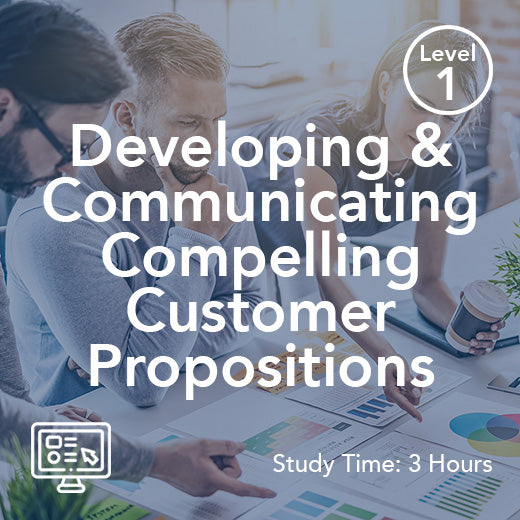
Developing and Communicating Compelling Customer Propositions (On-Demand)
For businesses to be successful, they need to align with their customers’ requirements in a number of key ways - but fundamentally it comes down to understanding the customer(s), creating compelling customer propositions, communicating those propositions, and enabling the value exchange. It encompasses product development, marketing and marketing communications, and business development / sales activities. This programme looks at the customer proposition holistically. It covers all the key elements needed to develop a sustainable business model that is tightly aligned with customer requirements, gets the right information in front of the right customers in an engaging and compelling way, and supports the overall strategy by delivering sustainable competitive advantage. We use exercises, case studies, break-outs and discussions to develop competencies and confidence, and the tools used will allow participants to apply the techniques to the workplace immediately. Topic Areas Include: Creating Compelling Customer Propositions Customers – Making Critical Choices Strategy and the Customer Proposition Customer Segments Products Brand Components of a Brand Pricing Expectation and Consistency The 80/20 Golden Rule Sales and Business Development Linking Marketing and sales – Lead Generation Sales – Common Objections Overcoming Common Objections Establishing a Sales Decision Process Responding to RFPs Telecoms Business Simulation Communicating Compelling Customer Propositions Channels to Market Key Elements of the Marketing Message The Psychology of Persuasion Segments, Profiles, Emotion Marketing Communications Online Marketing Marketing Systems and Frameworks Customer Retention and Loyalty Marketing Communications Plan Developing a Marketing Communications Plan Developing a Campaign for Lead Generation / Sales Assessing the Marketing and Communications Plan - KPIs International Marketing Market Research Marketing Resource
£95.00
-
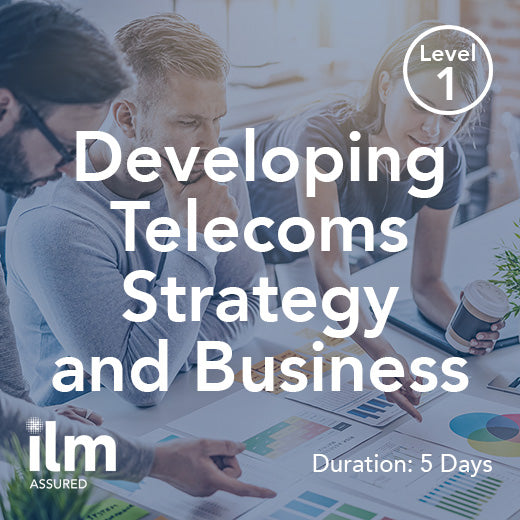
Developing Telecoms Strategy and Business
The Developing Telecoms Strategy and Business explores the key areas for business success, bringing the concepts together within a comprehensive team-based business simulation that runs throughout the programme - allowing the ideas to be developed and applied to a realistic and challenging simulated environment. The programme delivers comprehensive training for mid-senior managers, directors, specialists, consultants and identified talent working within the telecommunications, connected innovation, and adjacent industries. This programme has been assured by ILM. Assured status provides validation and recognition for the learner. It is a symbol of learning excellence and quality and is a reassurance that the training undertaken meets best practice standards. Focused Modules: Industry, Business & Tech Insight Telecoms Technology Evaluating & Optimising Business Models Controlling the Finances Leading, Developing & Supporting Effective People Creating & Communicating Compelling Customer Propositions Maintaining Effective Governance Optimising & Transformation (incl. Platforms & Processes) Who should attend? The programme is ideal for those in a telecoms-related management, leadership, or consultancy position within: Corporate organisations , working to ... grow and develop new and existing departments or divisions align departments or divisions to corporate strategy and vision Growing businesses that are making the transition to a sustainable long-term proposition Start-up departments Successfully complete the Developing Telecoms Strategy & Business to: Rapidly enhance your knowledge and competencies in the key areas of telecoms business. Establish a Blueprint for effectively leading your business or team. Implement all key aspects of the blueprint consistently and coherently. Develop more effective strategies, key performance enablers, and business models. Focus on maximising value creation for your organisation and your customers. Develop a solid understanding of telecoms technology and deployment options and how this impacts the business. Break those silo barriers. Better lead, support, and enhance the performance of your people. Take a more active role in evolving company culture, innovation and processes. Assess ideas and opportunities more rigorously and take a more dynamic leadership role. About ILM ILM is the UK's leading provider of leadership. coaching and management qualifications and training. We work with organisations in all sectors to help them define, develop and embed the leadership and management capability they need to succeed.ILM provides qualifications in leadership and management, coaching and mentoring and specialist areas such as social enterprise. We accredit 2,500 training experts to deliver our qualifications globally. Venue: King's Building, King's College London The King's Building, located on the Strand Campus. This historic landmark and stunning architectural masterpiece is a hub for innovation, learning, and cultural exchange. King's Building offers a unique blend of rich history and modernity, making it the perfect place for professional development and thought leadership. "The best classes I’ve attended focusing on Telco industry, very insightful and spot-on" CSC“Trainers were excellent. Really like how lively the classroom was, the class participation and energy is vibrant and positive.” CWC"Excellent training with great knowledge for the telecom industry" MS
POA: Private Course
-

Evaluating and Optimising the Business Models
Business models define a mix of activities required within a business to support a specific strategy. Collectively, one or more business models, aligned to a well-thought-out strategy, will deliver the competitive advantage needed to compete successfully in the market, and against any relevant competition. Business models are often complex, with multiple models running in parallel, and often in competition with each other within the business (in addition to the external competition). In this programme, we deconstruct the business model in order to fully understand its component parts before looking at how those parts can be optimally configured / reconfigured in order to maximise value creation and competitive advantage. We use examples, exercises and case studies to build a solid foundation that can be used within your own organisation to help drive success. Who Would Benefit? These programmes deliver comprehensive training for employees at all levels within the organisation. They would benefit employees, mid-senior managers, directors, specialists, consultants and identified talent. Prerequisites None Topics Covered Include Definitions and Components of a Business Model Business Model(s) – In the Bigger Picture Relationship - Strategy, Business Models and Operations Business Model Definition Understanding Value Extraction Developing The “Fit” of Activities – Examples Partnerships and the Business Model Customer Segments and Value Propositions Business Models – Options, Assessment and Development Understanding Value Business Model Disruption Business Model Adaptation Defining New Business Models Successful Examples for Redefined Business Models Business Models – The [Many] Options Explored
POA: Private Course
-
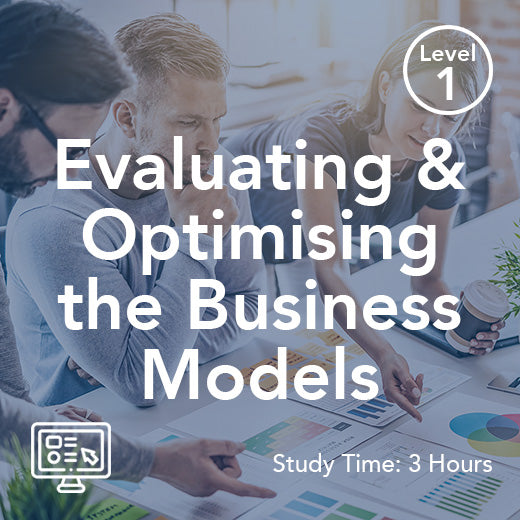
Evaluating and Optimising the Business Models (On-Demand)
Business models define a mix of activities required within a business to support a specific strategy. Collectively, one or more business models, aligned to a well-thought-out strategy, will deliver the competitive advantage needed to compete successfully in the market, and against any relevant competition. Business models are often complex, with multiple models running in parallel, and often in competition with each other within the business (in addition to the external competition). In this programme, we deconstruct the business model in order to fully understand its component parts before looking at how those parts can be optimally configured / reconfigured in order to maximise value creation and competitive advantage. We use examples, exercises and case studies to build a solid foundation that can be used within your own organisation to help drive success. Who Would Benefit? These programmes deliver comprehensive training for employees at all levels within the organisation. They would benefit employees, mid-senior managers, directors, specialists, consultants and identified talent. Topic Areas Include: Definitions and Components of a Business Model Business Model(s) – In the Bigger Picture Relationship - Strategy, Business Models and Operations Business Model Definition Understanding Value Extraction Developing The “Fit” of Activities – Examples Partnerships and the Business Model Customer Segments and Value Propositions Business Models – Options, Assessment and Development Understanding Value Business Model Disruption Business Model Adaptation Defining New Business Models Successful Examples for Redefined Business Models Business Models – The [Many] Options Explored
£95.00
-

Leadership in Business
Being an effective leader is difficult. Some in leadership positions struggle with the basics, others have huge gaps in their understanding, and many restrict themselves to management activities - actively avoiding actual leadership wherever possible. In most cases, the confidence to lead effectively is in short supply, and those that do have the confidence often confuse dominance, or power, with leadership. However, organisations who see good leadership and culture as THE key enablers for their people, are the ones most likely to thrive and prosper – in whatever field they are operating in. This comprehensive programme builds a solid understanding of leadership and culture in business, giving current and aspiring leaders the confidence and tools needed to better engage, guide, develop, coach, organise, assess, and most critically, empower their people, teams and departments. We develop a deep understanding of leadership, including all key aspects related to ourselves as an effective leader; understanding and engaging with our people; developing successful teams; and influence as a primary foundation. We follow this by an extensive look at how we can successfully support and deploy our people whilst building a balanced culture that maximises success, enables innovation, and drives engagement at every level. Exercises, discussions, break-outs, case studies and examples are used throughout in order to maximise learning, build confidence, and establish the foundations for successful leadership. Prerequisites None Topics Covered Include Leadership in Business / Organisations Developing Effective Teams Influence and Communication Supporting and Deploying Effective People – Culture and Innovation
POA: Private Course
-

Leadership in Business (On-Demand)
Being an effective leader is difficult. Some in leadership positions struggle with the basics, others have huge gaps in their understanding, and many restrict themselves to management activities - actively avoiding actual leadership wherever possible. In most cases, the confidence to lead effectively is in short supply, and those that do have the confidence often confuse dominance, or power, with leadership. However, organisations who see good leadership and culture as THE key enablers for their people, are the ones most likely to thrive and prosper – in whatever field they are operating in. This comprehensive programme builds a solid understanding of leadership and culture in business, giving current and aspiring leaders the confidence and tools needed to better engage, guide, develop, coach, organise, assess, and most critically, empower their people, teams and departments. We develop a deep understanding of leadership, including all key aspects related to ourselves as an effective leader; understanding and engaging with our people; developing successful teams; and influence as a primary foundation. We follow this by an extensive look at how we can successfully support and deploy our people whilst building a balanced culture that maximises success, enables innovation, and drives engagement at every level. Exercises, discussions, break-outs, case studies and examples are used throughout in order to maximise learning, build confidence, and establish the foundations for successful leadership. Topics Covered Include Leadership in Business / Organisations Developing Effective Teams Influence and Communication Supporting and Deploying Effective People – Culture and Innovation
£95.00
-

LTE Technologies, Services and Markets
LTE technologies are at the forefront of the telecommunications industry, offering faster speeds and more reliable connections for both mobile and fixed services. Our LTE Technologies, Services, and Markets training course (Course Code: LT3601) provides a comprehensive overview of the Evolved Packet System (EPS) that makes up the LTE system. This course is designed for non-technical professionals who are new to or already working in the telecommunications sector, offering a non-technical introduction to LTE and its place in the evolving telecom market. With 2 live online sessions spread over 1 day, participants will gain an understanding of LTE services, market segments, target users, key features, network architecture, and technology roadmaps toward LTE. No technical knowledge is assumed, making this course accessible to individuals with varying levels of experience in the industry. By exploring the applications and synergies of LTE technology, participants will be equipped with the knowledge needed to navigate the dynamic landscape of LTE services and markets. Join us for this informative training course to stay ahead in the telecommunications industry and gain insights into the advancements and opportunities offered by LTE technologies. Whether you are looking to expand your knowledge or enhance your skill set, this course will provide you with valuable insights into the world of LTE and its impact on the telecommunications sector. Who would benefit This course is intended for non-technical professionals either new to, or already working in, the mobile or fixed telecommunications sector. Prerequisites No technical knowledge is assumed but some familiarity with the telecommunications industry would be beneficial. Topic Areas Include The evolving mobile telecommunications market LTE services and service aims LTE market segments LTE target users Key features of LTE LTE network terminology E-UTRAN architecture Evolved Packet Core (EPC) architecture Why all-IP? LTE for fixed and mobile services Technology roadmaps toward LTE LTE timescales Applications for LTE LTE technology synergies
POA: Private Course
-

Maintaining Effective Governance
The business world is ever-changing, with focus shifting constantly as industries develop and evolve. Increasing requirement for good governance, however, has been a constant focus over a number of decades now. Companies that embrace good governance as part of their core value-system are invariably in a much better position as they scale, or as they expand /evolve their operating footprint to embrace new sectors or geographies. At its most effective, good governance, is felt throughout the organisation – with shareholders, employees and customers all more likely to engage in a positive and engaging way as the organisation develops. At its worst, bad governance directly contributes to dangerous working conditions or environmental disaster – and very likely, costly lawsuits, and competitive disadvantage. This short module is designed to complement our other business programmes by exploring key aspects of governance and what it all means for businesses. Comprehensive discussions and examples are used to illustrate the wide and varied topics covered, the critical focus areas within each topic, and how progressive governance can be used to positively impact, not only the business, but wider society. Prerequisites None Topics Covered include: Health and Safety Data Protection Ethical Financial Reporting Employment Practices Charity / Social Engagement Environment and Sustainability Aligning with the UN Sustainable Development Goals Consequential Thinking – The Four-Way Test Sustainability – Example Approached
POA: Private Course
-
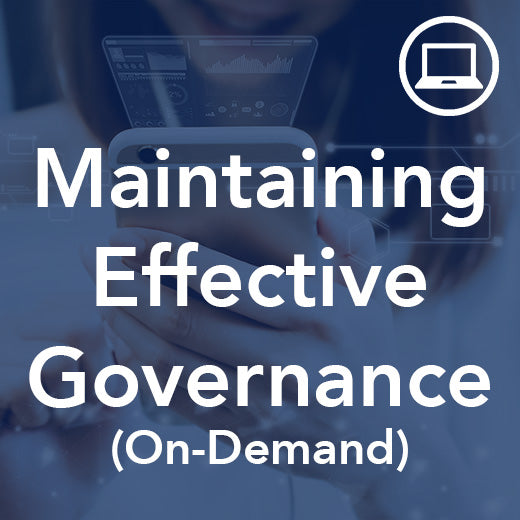
Maintaining Effective Governance (On-Demand)
Course Code LB06 Course Summary The business world is ever-changing, with focus shifting constantly as industries develop and evolve. Increasing requirement for good governance, however, has been a constant focus over a number of decades now. Companies that embrace good governance as part of their core value-system are invariably in a much better position as they scale, or as they expand /evolve their operating footprint to embrace new sectors or geographies. At its most effective, good governance, is felt throughout the organisation – with shareholders, employees and customers all more likely to engage in a positive and engaging way as the organisation develops. At its worst, bad governance directly contributes to dangerous working conditions or environmental disaster – and very likely, costly lawsuits, and competitive disadvantage. This short module is designed to complement our other business programmes by exploring key aspects of governance and what it all means for businesses. Comprehensive discussions and examples are used to illustrate the wide and varied topics covered, the critical focus areas within each topic, and how progressive governance can be used to positively impact, not only the business, but wider society. Prerequisites None Topics Covered include: Health and Safety Data Protection Ethical Financial Reporting Employment Practices Charity / Social Engagement Environment and Sustainability Aligning with the UN Sustainable Development Goals Consequential Thinking – The Four-Way Test Sustainability – Example Approached On-Demand Online Training Our self-paced on-demand distance learning programmes are accessible on any computer, tablet or smartphone and allow you to study at a time and location that is convenient to you. Each course includes: Illustrated Course Books - featuring leading edge knowledge from subject matter experts. Videos - Detailed videos expand the points covered in the course books, discussing topics in greater depth. Tutor Support – Dedicated course tutors are available to answer any questions you might have throughout your studies. Formative Assessment - Modules include regular quizzes to support learning by testing your knowledge of the subject matter. Certification– Successfully complete the end of module tests to earn Digital Badges to demonstrate the depth of your knowledge of the topic.
£95.00
-

Mini MBA – Digital and Connected Technology
Businesses that are transitioning to, or are underpinned by digital and connected technology face a unique set of challenges compared to traditional organisations. As companies move into new areas of development and operation, it is critical that management teams across the organisation embrace the fast pace of change and realignment - whilst continuing to maximise their existing opportunities. The goal is an agile and flexible organisation that is aligned on strategic imperatives, fully focused on customer requirements and the value-exchange, and with an enhanced ability to collaborate and partner within complex ecosystems.This programme is designed to provide an excellent foundation on which senior managers can fast-track their competency development within the relevant areas. We take a comprehensive look at the business environment, industry trends and drivers, technologies and frameworks, financial aspects if digital and hi-tech, customer proposition, strategy, business models and positioning – and critically, at how it all fits together.Participants will significantly enhance their capabilities in terms of strategy-setting and alignment, evaluation and decision-making, business model development, alignment of departments and teams to strategic imperatives, and people / culture development. Delivery and Programme Schedule: Group Work, Business Simulation and Case Studies: These run throughout the programme and are designed to enable participants to explore and share ideas, identify best practice, build confidence, and develop a shared view of a future position. Focused Modules: Hi-Tech - Business Environment and Use Cases Digital and Connected Technologies Explained Finance for Hi-Tech Business Models Innovation – Methods and Innovation Sprint Strategy, Business Models and the Customer Proposition This programme is aimed at: Senior or (aspiring senior) managers involved in hi-tech industries that are underpinned by digital and connected technology Those who need to rapidly build their knowledge and competencies in order to maximise their contribution to their organisation, and to lead their team(s) effectively. Those working with, or making decisions that are impacted by emerging opportunities and trends within hi-tech industries. Management teams – enabling a candid and hard-hitting evaluation of the status quo, alignment of ideas, and development of a shared future vision For pricing options contact us on: info@wraycastle.com
POA: Private Course
-

Mini-MBA in Telecoms – a Blueprint for Future Business
A comprehensive Telecoms Mini-MBA programme covering all the essential elements needed to effectively lead and manage in Telecoms and related industries The Mini-MBA in Telecoms explores the key areas for business success, bringing the concepts together within a comprehensive team-based business simulation that runs throughout the programme - allowing the ideas to be developed and applied to a realistic and challenging simulated environment. This programme delivers comprehensive training for mid-senior managers, directors, specialists, consultants and identified talent working within the telecommunications, connected innovation, and adjacent industries. Focused Modules: Industry, Business & Tech Insight Telecoms Technology Evaluating & Optimising Business Models Controlling the Finances Leading, Developing & Supporting Effective People Creating & Communicating Compelling Customer Propositions Maintaining Effective Governance Optimising & Transformation (incl. Platforms & Processes) Who should attend? The programme is ideal for those in a telecoms-related management, leadership, or consultancy position within: Corporate organisations , working to ... grow and develop new and existing departments or divisions align departments or divisions to corporate strategy and vision Growing businesses that are making the transition to a sustainable long-term proposition Start-up departments Mini-MBA in Telecoms - Key benefits: Successfully complete the Mini-MBA in Telecoms to: Rapidly enhance your knowledge and competencies in the key areas of telecoms business. Establish a Blueprint for effectively leading your business or team. Implement all key aspects of the blueprint consistently and coherently. Develop more effective strategies, key performance enablers, and business models. Focus on maximising value creation for your organisation and your customers. Develop a solid understanding of telecoms technology and deployment options and how this impacts the business. Break those silo barriers. Better lead, support, and enhance the performance of your people. Take a more active role in evolving company culture, innovation and processes. Assess ideas and opportunities more rigorously and take a more dynamic leadership role. "The best classes I’ve attended focusing on Telco industry, very insightful and spot-on" CSC“Trainers were excellent. Really like how lively the classroom was, the class participation and energy is vibrant and positive.” CWC"Excellent training with great knowledge for the telecom industry" MS
POA: Private Course
-

Optimising Operations & Transformation (On-Demand)
Organisations tend to have a great deal of momentum – the bigger the organisation, the more difficult it can be to change, pivot and reposition. Even smaller business units can be very difficult to transform. Most successful businesses are in a constant state of flux, and they embrace change in order to optimise and pivot accordingly. Whether it is slow evolution, or larger initiatives that require fundamental reorganisation and refocusing of resources and people, the best businesses are able to drive those changes, embrace the new opportunities and maintain their agility and flexibility. This programme explores change within businesses / organisations – whether it is a case of optimising operations, or full-on transformation, we hit the key barriers and enablers for change, before exploring the change process and the role of the leader and key stakeholders. People issues are given a particular focus – in terms of individual and team factors, and the critical role that culture plays in the change process (and in the ongoing organisation). Exercises, case-studies, discussions and break-outs are used to reinforce learning, and to build confidence that participants need to effect positive change in the workplace – whatever size of organisation they work in. Topic Covered Include Key Principles – Optimising Operations and Transformation The Issue of Company Momentum Momentum – the Impact of Corporate Culture and DNA Momentum – Impact of Corporate Attitude to Risk Momentum and Risk – the Results Resistance to Change – Illustrated Understanding the Nature of Change Change – a Non-Stop Journey Evolving to Stay Relevant and Optimised
£95.00
-

Optimising Operations and Transformation
Organisations tend to have a great deal of momentum – the bigger the organisation, the more difficult it can be to change, pivot and reposition. Even smaller business units can be very difficult to transform. Most successful businesses are in a constant state of flux, and they embrace change in order to optimise and pivot accordingly. Whether it is slow evolution, or larger initiatives that require fundamental reorganisation and refocusing of resources and people, the best businesses are able to drive those changes, embrace the new opportunities and maintain their agility and flexibility. This programme explores change within businesses / organisations – whether it is a case of optimising operations, or full-on transformation, we hit the key barriers and enablers for change, before exploring the change process and the role of the leader and key stakeholders. People issues are given a particular focus – in terms of individual and team factors, and the critical role that culture plays in the change process (and in the ongoing organisation). Exercises, case-studies, discussions and break-outs are used to reinforce learning, and to build confidence that participants need to effect positive change in the workplace – whatever size of organisation they work in. Prerequisites None Topic Covered Include Key Principles – Optimising Operations and Transformation The Issue of Company Momentum Momentum – the Impact of Corporate Culture and DNA Momentum – Impact of Corporate Attitude to Risk Momentum and Risk – the Results Resistance to Change – Illustrated Understanding the Nature of Change Change – a Non-Stop Journey Evolving to Stay Relevant and Optimised
POA: Private Course
-
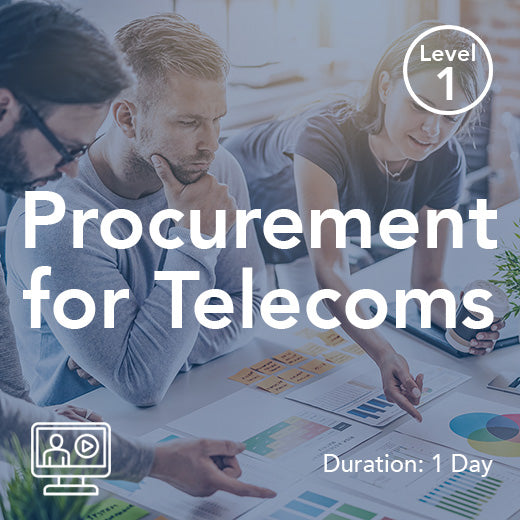
Procurement for Telecoms
Procurement plays a vital role in the telecommunications industry, ensuring the efficient and cost-effective acquisition of goods and services necessary for operations. With the rapid pace of technological advancements and evolving customer demands, telecom companies rely on procurement professionals to source and negotiate contracts for network infrastructure, equipment, software, and services. Effective procurement strategies can help telecom companies optimize their supply chains, control costs, and ensure efficient delivery of products and services. Furthermore, the procurement function involves managing vendor relationships, conducting market research, and staying updated on industry trends to drive innovation and maintain a competitive edge in this dynamic sector. The one-day Procurement for Telecoms course will enable you to build a better understanding of the key concepts and strategies in procurement and apply these concepts to your own organization. Prerequisites A basic understanding of business concepts and operations within the telecoms industry would be helpful, as would some familiarity with emerging Industry trends. Who would benefit? This training course would benefit telecoms executives or managers who work in, or have an interest in, the procurement process within telecoms and related organisations. Course Modules: Concepts of Procurement in Telecoms Supplier Strategy Identifying Potential Category Specific Procurement Levers Implementing a strategy CSR and Carbon Neutral for Procurement in Telecoms Course Director: Tim Williams Tim is a seasoned professional with extensive experience in procurement and supply chain management, his expertise spans strategic procurement advisory, procurement transformation, stakeholder management, and driving improvements in procurement functions. Tim is a Fellow of the Chartered Institute of Purchasing and Supply and has held significant leadership roles including: Senior Advisor to a Major Strategic Global Consultancy Chief Procurement Officer MTN Group (Location Dubai) Director of SCM Transformation and Services Procurement, Vodafone Procurement Company Head of Supply Chain Transformation Vodafone Group
POA: Private Course
-

Strategy in Business (On-Demand)
Strategic decision-making is a key component of the vast majority of successful businesses, and the impact of those decisions is very likely to have a huge bearing on the success (or otherwise) of the organisation. Despite the intention that company strategy should drive and guide the mix of activities, and both focus and align efforts within appropriately configured units / departments, very few companies give it the time and attention needed to maximise the impact of good decision-making. This programme looks at each component of strategy in turn, with the decision-making process at the heart of a much more extensive set of activities need to maximise the impact of good strategy. We look at the nature of Strategy; building Awareness (industry, market, business dynamics, company-specific); strategic Analysis; strategy Development; strategy Execution; and key Performance Enablers. We draw all the relevant and varied information together, presenting it as a single flow of processes that can be used to drive successful strategy within any business, department or organisation. Who Would Benefit? These programmes deliver comprehensive training for employees at all levels within the organisation. They would benefit employees, mid-senior managers, directors, specialists, consultants and identified talent. Topics Covered: Understanding Strategy, Industry and Business Dynamics Understanding the Nature of Strategy Building Awareness Analysing the Market; Developing Strategy & Competitive Advantage, Strategy Execution, KPIS & OKRs Carrying Out Strategic Analysis Developing the Strategy Strategy Execution Key Performance Enablers
£95.00
-
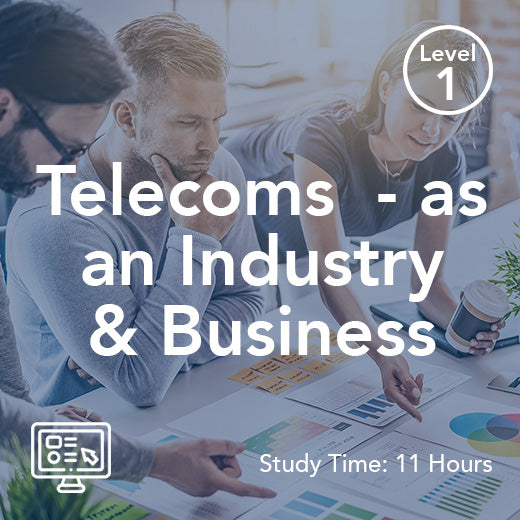
Telecoms – as an Industry and Business (On-Demand)
The Telecoms Industry is based on a range of technologies that are extremely diverse, wide ranging, and highly complex. With this foundation, the industry is able to support a wide variety of service propositions in a significant number of identifiable sectors, and as a result, a vast array of business models. The complex business ecosystems are comprised of many thousands of companies and the relationships that exist between them. This includes Communications Service Providers (CSP), Network Equipment and Handset Vendors, Service / Support Companies, Standardisation Bodies, Regulators, and Content / Media Companies. The ecosystems are dynamic in nature and evolving rapidly in terms of focus. The sheer scale of it all makes it difficult to fully understand and analyse, but in this course, we start that process. We explore the overall make-up of the industry and the business dynamics; the types of organisations involved and their roles and relationships; the service propositions; and main customer segments. We also briefly consider company strategy and business models. An evaluation of the key technologies that support the industry is made, including projections, time-lines and overall market trajectories. Topic Areas Include: Telecoms Industry and Business Dynamics The Technology Explained and Evaluated Telecoms Industry and Market Update
£500.00
-

The Telecoms Industry Explained
The Telecoms Industry is based on a range of technologies that are extremelydiverse, wide ranging, and highly complex. With this foundation, the industry is ableto support a wide variety of service propositions in a significant number of identifiablesectors, and as a result, a vast array of business models. The complex business ecosystems are comprised of many thousands of companiesand the relationships that exist between them. This includes CommunicationsService Providers (CSP), Network Equipment and Handset Vendors, Service /Support Companies, Standardisation Bodies, Regulators, and Content / MediaCompanies. The ecosystems are dynamic in nature and evolving rapidly in terms offocus. The sheer scale of it all makes it difficult to fully understand and analyse, but in thiscourse, we start that process. We explore the overall make-up of the industry and thebusiness dynamics; the types of organisations involved and their roles andrelationships; the service propositions; and main customer segments. We also brieflyconsider company strategy and business models. An evaluation of the keytechnologies that support the industry is made, including projections, time- lines andoverall market trajectories. Course Contents Telecoms Industry and Business Dynamics The Technology Explained and Evaluated Telecoms Industry and Market Update
POA: Private Course
-

TowerCo Master Services Agreements (MSA)
A concise course on interpreting TowerCo Master Services Agreements, focusing on telecommunications industry contracts. While this course is not a substitute for legal advice, it will empower you to understand and navigate these complex agreements, covering topics from the importance of contracts to verifying agreement accuracy, contract validity, proactive contract management, and an in-depth exploration of typical contract sections. By the end of this course, you'll be equipped to make informed decisions and safeguard your organisation's interests. Course Contents: Contractual fundamentals Jargon buster approach Cellsite outsourcing in context Importance of proactive contract management to avoid costly disputes Generic form of a TowerCo Master Services Agreement Authority Matrixes
POA: Private Course
-

Wray Castle Hub (12 Month Subscription)
Annual Telecoms Training Subscription Package with Unlimited access to 500+ hours of key training material Empower your professional development by building your knowledge of key technology and business topics within the telecoms industry. Unlimited access to future new courses that will cover the latest technology developments as they are added to Hub throughout your 12-month subscription period. Endlessly flexible and applicable to any role within the telecoms industry a subscription to Wray Castle Hub is your ultimate learning resource. You can choose to follow one of our suggested learning pathways, build your own or dip into the learning material module by module. The Wray Castle Hub is also available as an 6-Month Subscription for £945. Learn more here.
£1,400.00
-

Wray Castle Hub (6 Month Subscription)
6-Month Telecoms Training Subscription Package with Unlimited access to 500+ hours of key training material Empower your professional development by building your knowledge of key technology and business topics within the telecoms industry. Unlimited access to future new courses that will cover the latest technology developments as they are added to Hub throughout your 12-month subscription period. Endlessly flexible and applicable to any role within the telecoms industry a subscription to Wray Castle Hub is your ultimate learning resource. You can choose to follow one of our suggested learning pathways, build your own or dip into the learning material module by module. The Wray Castle Hub is also available as an Annual Subscription for £1,400. Learn more here.
£945.00
-

Wray Castle Industry Primers Collection
The Wray Castle Industry Primer collection gives you unlimited access to our growing library of short, focused online training courses. Get upskilled on your chosen topics in just 3 hours with our collection of new short online primers. Our primers cover the key technology and business topics shaping the industry today and tomorrow. You'll benefit from videos, illustrated course books, dedicated tutor support, and regular assessments and earn digital badges to showcase your achievements. A subscription gives you access to all the existing primers below plus all future primers as and when they are published, so you'll always stay ahead of the latest developments across the industry.
£450.00
-

Wray Castle Learning Account
Upskill your workforce with flexible, scalable training solutions The Wray Castle Learning Account offers a flexible, scalable training solution for organizations, enabling upfront budgeting, tailored programs, and comprehensive reporting. Key Features Customised Programmes - Work directly with us to build training programmes tailored to your organization's needs, ensuring budget safety and scalable delivery. Wide Course Variety - Access live sessions, live virtual training, e-learning modules, private team workshops, and expert consultancy services. Upfront Planning - Allocate funds in advance, plan training strategically, align with organizational goals, and gain comprehensive reporting on spend and consumption. Programme Benefits Budget Control & Safety - Maintain complete oversight of training expenditure with upfront allocation. Strategic Alignment - Plan training initiatives with competency assessment options to meet organizational goals. Additional Resources - Access webinars, primers, and supplementary learning materials. Visibility & Reporting - Comprehensive tracking and reporting on training consumption and ROI. Broad Topic Coverage - Wide range of subject areas to address diverse training needs. Simplified Invoicing - VAT invoicing and payment via Purchase Order for streamlined procurement. The Wray Castle Learning Account is ideal for: Organizations seeking to centralize training and budgets. Teams with predictable training spend looking for simplified invoicing and reporting. Organizations requiring scalable training solutions for growing teams L&D and Training Managers who need to demonstrate clear ROI. Ready to transform your training contact us today?
POA: Private Course








































